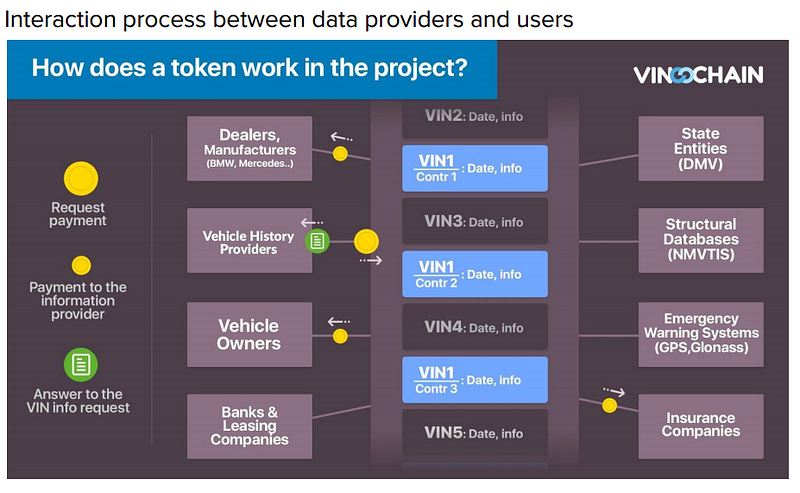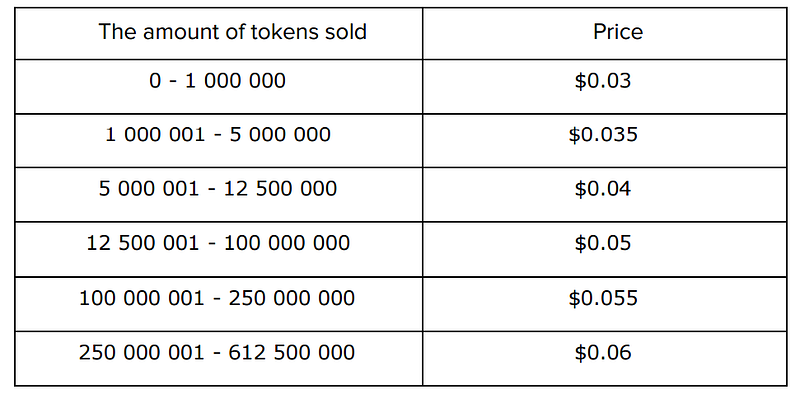VinChain - Decentralized Vehicle History

Problem The problem was recorded and explained by Nobel laureate economist George Akerlof in his published scientific work 'The Market for' Lemons ': Quality Uncertainty and the Market Mechanism' in 1970. He described the functioning of markets where one party (the seller) knows more about the product than the other party (the buyer). This is also known as "markets with asymmetric information". The market for used cars is an example. When selling a car, the seller usually knows considerably more about the vehicle than the buyer. This is a problem for buyers because it opens them up for possible fraud. In order to hedge against the risk of buying a 'bad' car, the buyer lowers the price he is willing to pay for the vehicle.
This is how it happens:
● A buyer can not fully distinguish a good car from a bad car, so they are willing to pay less for the vehicle. This reduces the average price of the vehicle.
● Due to the lower average price, most cars sold are of lower quality, so those who sell good cars leave the market.
● In this way, the average quality of the goods deteriorates on the market, so buyers are prepared to pay even less than before. This reduces the average price of a car even further. 2
● Now sellers of medium-quality cars are forced to leave the market.
● The quality of the cars will deteriorate again and the average amount that the buyers are willing to pay will fall proportionally. This cycle continues until the buyers no longer buy a car because they assume that they are all of poor quality.
● As a result, this will lead to the complete disappearance of the market. This is the nature of markets with asymmetric information. This cycle can only be stopped by removing information asymmetry. Solution: VinChain project VinChain solves the problem of asymmetric information on the used vehicle market by creating a decentralized, unchangeable, transparent, safe and reliable vehicle life cycle repository.
This cycle can only be stopped by removing information asymmetry.
Solution: VinChain
Project VinChain solves the problem of asymmetric information on the used vehicle market by creating a decentralized, unchanging, transparent, safe and reliable vehicle life cycle repository.
VinChain is a blockchain database that registers all information relating to vehicles. For each vehicle the information is collected during the entire usage period. This history is transparent and accessible to everyone.
To protect the accuracy of the information, the technology of distributed storage is used. This guarantees absolute reliability and data security. Every day hundreds of thousands of used cars are sold in the world and every buyer wants reliable information about the technical condition of the car. This is an important security, financial and security problem.
Unfortunately, there is no database with cars. There are commercial bases, but they do not solve this problem. Their information is stored centrally and there is a risk that it is incorrect. Commercial bases are closed and do not exchange information among themselves. As a result, the buyer of the car risks losing his own safety and money.
VinChain solves this problem using blockchain technology.
For each car we will issue a blockchain passport, which will be stored in a distributed register. The VinChain project will unite all data providers and create a continuous history of the car, without the disadvantages of centralized databases. Market participants such as car manufacturers, car dealers, insurance companies, banks and leasing companies all need a history of exploitation and they need transparency, affordability, reliability and authenticity. Buyers who currently choose a car can also order our report immediately.
How it works
Upon request, the information corresponding to the requested VIN number is searched and selected in the blockchain. Each record contains information about the data provider, the date, the VIN and the use of the car.
Basic use and customer economy Vinchain plans to implement a token to simplify the processing of car data requests on the VinChain system. An end user pays VinCoin in exchange for all information relating to a finnumber that is currently stored in the chain. The information queries are designed to rely on a very simple symbolic economy for customer-oriented aspects of the payment system. In order to have a successful token system now, it is necessary to use simple economic aspects. Widespread adoption of each system is easiest when end users can understand the process sufficiently to rely on it. For a user who wants to retrieve information from the VinChain system, the transaction costs are always VinCoin.
Market volatility must be linked to the fluctuation of car history data and not to speculation. The VinChain token will primarily be a token for use or use that is used to create a stable transaction rate and to allow fluid commission payments and profit distributions for all information providers. Initial pre-ico tokens are $ 0.03, ico-tokens will be $ 0.05 and long-term transaction rates are expected to be at least $ 3 per transaction. Compared to the current rates of competitors, this $ 3 price is easy to see as a 98% saving compared to similar questions about brand history.
By implementing a low-friction solution, we can offer a comparable product to competitors at a fraction of the cost. Unlike traditional car history options, it will be possible for certified technicians and other actors in the control chain to submit car data that would previously be overlooked due to a lack of reporting on insurance.
Over time, more information providers will be verified. VinChain will allow crowdsourced information on car histories on a larger scale.
Business model

- The data evaluation of the supplier is based on a ranking.
- Tokens are paid to each blockchain request.
- Each report contains details about the car from different suppliers.
- Each supplier whose data has been used in the report receives payment tokens.
- VinChain receives a commission from each request.
The operation of the VinChain system is as follows:
when we receive a request for the blockchain, we look for the data in the entire chain and we create and deliver the information in a structured form. The fee for the information is received by the members of the register whose information has been used. Both sellers and buyers of used vehicles will benefit from removing asymmetric information from the market for used cars.
When the buyer knows all available information about a certain vehicle, this will create confidence in the process and be prepared to pay more. For the seller, publicizing the entire vehicle history increases the value of the car at the time of the sale. If a buyer knows the full operational history of the vehicle, he / she has a guarantee that the vehicle retains a certain level of value. The same can not be said about a vehicle without a report.
This can be explained by the following example:
If a buyer has to choose between two exactly identical vehicles, one has a fully operational history report, while the other does not; the buyer chooses the vehicle with the full operational report - even if the report indicates that the vehicle has been damaged in the past and has been repaired. This is the case because a report would guarantee the history of the vehicle. The VinChain project will tell the truth. Every economic operator has the right to know.
In the future, the technology can be extended to adjacent segments of the market: yachts, construction machinery, real estate.
Project goals The global market for used cars is changing by making them honest, transparent, reliable and with equal access to information for each participant.
Project goals
1. Create a block with different levels of access and information protection. Data security level must match the needs of government agencies.
2. Unite the participants in the automotive industry, such as manufacturers, insurance companies, dealers, service stations, developers of navigation systems, into a single ecosystem for data exchange purposes.
3. Create an infrastructure and give direct access to the database for each market participant.
ICO description
Why Blockchain?
The advantages of using blockchain technology for VinChain:
- Blockchain can store all information about the maintenance of the vehicle.
- The ability to adjust the access levels for different users.
- Absolute reliability.
- Transparent system of awards for data providers.
- The ability to work directly with any market player \
- Resistance to network attacks
Pre-sale of tokens for early investors
Presale: 1-24 December, 12,000,000 tokens will be available for placement with the sales ban for 3 months after the ICO is over.
Tokens emission and sales on ICO
ICO will be held from March 22 through April 15, 2017. Payment methods available for the VinChain tokens:
- Bitcoin (BTC)
- Ethereum (ETH)
- Riple (XRP)
- Litecoin (LTC)
- Waves (WAVES)
- USD, EUR, GBP
Available for placement: 600,000,000 tokens.
The tokens are distributed between the buyers within 72 hours of the completion of the ICO.
Hard cap
Maximum investment amount: $ 34,500,000.

The distribution pattern of tokens is as follows:
The distribution pattern of the Genesis block in VinChain Network contains 1,000,000,000 utility tokens.
- 600,000,000 => are distributed among ICO members;
- 250,000,000 => reserved for founders, consultants and other members of the team with a 2 year sales restriction;
- 137,500,000 => are reserved with a sales restriction of 2 years;
- 12,500,000 => are reserved for early investors with a 3 month sales restriction after the end of ICO
VinChain Team
Everyone in our team is an expert and has experience in the automotive industry. Each of us knows how to achieve the goal.
Alex Miles - Project manager. Founder of Mealful LLC. Elena Krasenkova - Head of sales at A Better Bid Car Auctions LLC, increased monthly sales by 150%.
Alexey Listopad - Director of Marketing. Bought 9 projects, including an auction for a better bid on the American market.
Andrey Krainik - founder of Easyexport.us, one of the top 10 companies in the inc. 500 with an annual turnover of more than $ 45 million
Jurgis Plikaitis - CEO and founder. Online expert in the field of automatic auctions. Serial entrepreneur. $ 500 million total revenue from established companies.
For more information :
WEBSITE: https://vinchain.io/en
WHITEPAPER: https://vinchain.io/files/white_paper.pdf
ANN THREAD: https://bitcointalk.org/index.php?topic=2349186.0.all
WHITEPAPER: https://vinchain.io/files/white_paper.pdf
ANN THREAD: https://bitcointalk.org/index.php?topic=2349186.0.all

Komentar
Posting Komentar